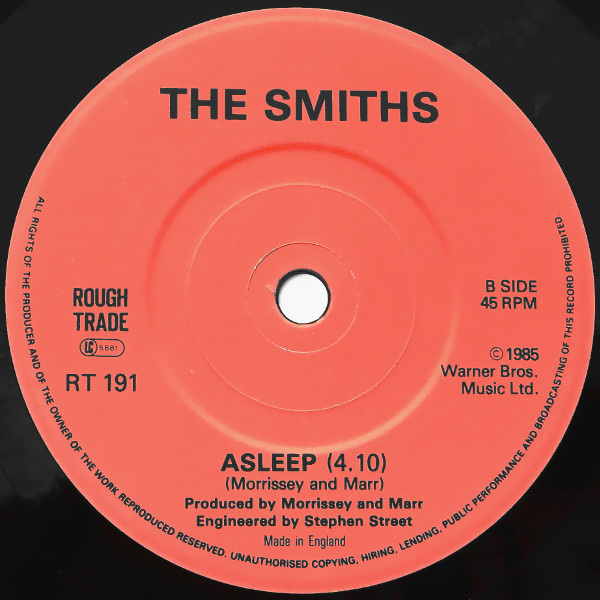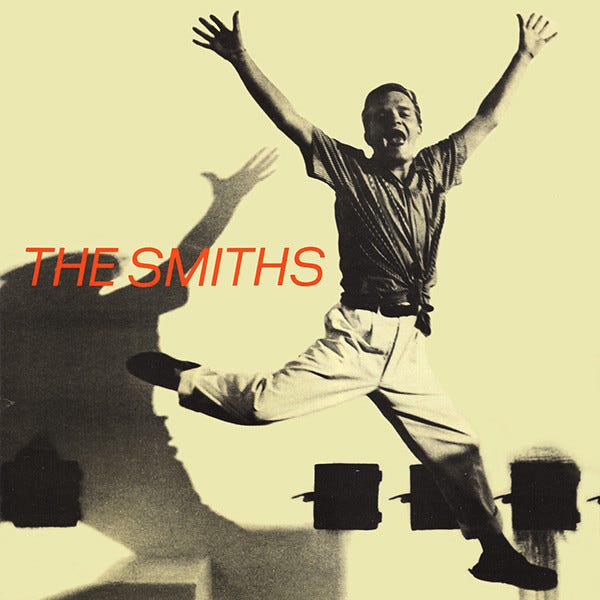"Asleep"
The Smiths' Haunting Lullaby
"People who kill themselves are usually pretty brave. I think that they’ve gone through it, and they’ve thought about it, and they’ve considered it, and they’ve found that the pain of existing is greater than the pain of not existing - which is a really brave decision to make."1
— Morrissey
“Asleep” offers a delicate portrayal of someone consciously deciding that life, as it stands, is no longer livable - giving voice to those who can no longer bear an existence defined by loneliness and pain. Rich in metaphor, the song explores the contemplation of suicide with haunting intimacy, making it difficult for some to listen to (the author included).
From a philosophical perspective, “Asleep” confronts the abyss of despair with lyrical subtlety, refusing simplistic moralizing and instead offering the listener a raw, honest exploration of the tragic beauty and profound ambiguity inherent in life’s darkest moments.
Its lullaby-like melody underscores the stark emotional weight, rendering an existential crisis both startlingly relatable and deeply moving. Notably, the song neither glamorizes nor condemns suicide; rather, it simply illuminates a deeply real -and, unfortunately, not uncommon - human experience.
Morrissey expresses his desire to "go to bed" and "not wake up," which, taken literally, suggests sleep, but metaphorically and psychologically implies a wish for death. Lines like "Don't try to wake me in the morning / 'Cause I will be gone" hints at suicidal ideation, that is clearly tied to deep emotional pain or chronic depression.
While the request to be sung to sleep and then "left alone" may seem paradoxical (a yearning for comfort followed by a desire for a distancing from others), it is a common characteristic of an individual in a deeply depressive state - craving connection while simultaneously seeking the cold comfort of isolation.
There’s an unsettling, quiet grace to the lyrics - the protagonist seems eerily calm, even relieved, as they prepare to depart: “Deep in the cell of my heart / I will feel so glad to go.”
The repetition of “There is another world... there is a better world… well, there must be” is profoundly poignant, capturing both heartfelt yearning and desperate hope. Morrissey’s subtle word choice - saying “must be” rather than “is” - reveals not a confident belief, as in conventional Christianity, but a fragile clinging to the mere possibility of something better. It reflects the essence of existential depression, where meaning is sought but remains elusive.
According to Stephane at PassionsJustLikeMine.com, “Asleep” was written at RAK Studios in London in August 1985, just before it was recorded (allegedly 'in about two hours'). Morrissey and Johnny produced the track, with Stephen Street as recording engineer. Elements from the piano part are very similar to the piano coda used in a 1982 studio recording of "Suffer Little Children" (later dropped for the definitive version of the song).2 Listen to this 1982 recording of "Suffer Little Children" (link below) beginning at 5:58 to hear the piano coda:
“Asleep” was released on September 16, 1985 as the B-side to “The Boy With The Thorn In His Side” single (on both the 7 and 12-inch formats). The runout on the single’s B-side was etched with “IS THAT CLEVER”3.
On the 1985 12-inch format of the single - where “Rubber Ring” precedes “Asleep” on its B-side - there is a segue between the two songs, presenting them as a continuous piece. The voice sample at the end of “Rubber Ring” is looped and faded into the wind noise that precedes “Asleep.”
Listen to the segue between the two tracks here beginning at 3:47:
The sound of “Asleep” is stripped of drums, bass, and guitar—relying instead on sparse ambient textures and a gently played piano to create a dreamlike, intimate atmosphere. From its opening whispers of wind and soft piano tones to its closing notes, where a child’s music box melody fades into silence, the song carries a haunting sense of inevitability, resignation, and timelessness. At moments, the listener is offered a fleeting glimpse - albeit an auditory one - of eternity itself. The production is delicate and understated, allowing Morrissey’s plaintive vocals and the emotional weight of the lyrics to take center stage.
Morrissey offers no answers - only a window into the quiet, complex reality of unbearable pain. In its haunting gentleness, the song illuminates a human experience often left unspoken and seldom explored in contemporary pop music. In this way, “Asleep” stands as a defiant work, giving voice to countless listeners who have undoubtedly faced moments of quiet desperation - moments when the unthinkable is contemplated. Its profound relatability forms the very cornerstone of the song’s enduring power.
"I’ve never made any secret of the fact that I’d be glad to die. I’ve never actually said, 'I want to kill myself,' but I’ve certainly felt that I’d be happy if it happened."4
Listen to this soundcheck performance of ‘Asleep’ from the Smiths’ concert at Eden Court Theatre in Inverness, Scotland on October 1, 1985:
From a conversation Morrissey had with Larry King during an episode of Larry King Now, originally aired on August 19, 2015.
http://www.passionsjustlikemine.com/songs/songs-asleep.htm
"Is that clever" is an allusion to a piece of sampled dialogue in "Rubber Ring" taken from The Importance of Being Earnest, a play that was referenced in the etchings of "William, It Was Really Nothing" and Hatful of Hollow.
Morrissey, interview with NME, 1984



